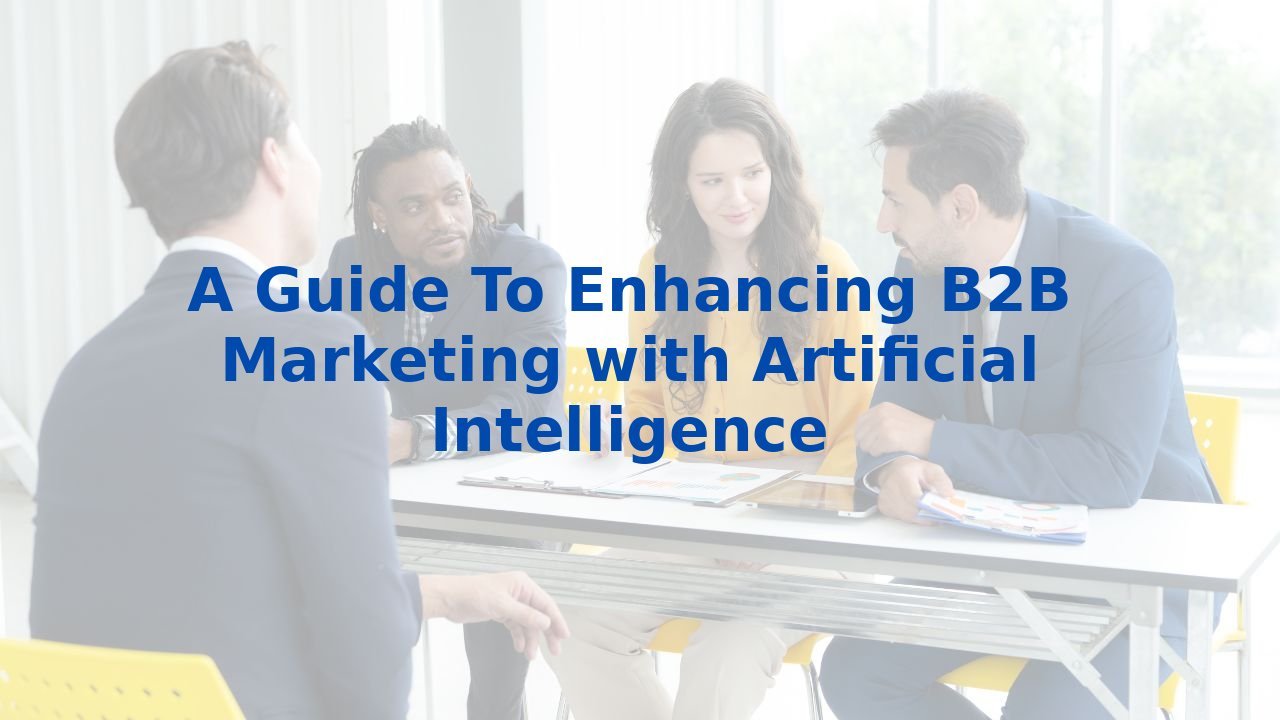A Guide To Enhancing B2B Marketing with Artificial Intelligence
A Guide To Enhancing B2B Marketing with Artificial Intelligence
In an era defined by rapid technological advancement, businesses must adapt to stay ahead of the competition. Artificial Intelligence (AI) has emerged as a transformative force in enhancing various business processes, particularly in the realm of marketing. This guide will delve into how AI can revolutionize B2B marketing strategies, streamline operations, and ultimately foster business growth.
Optimizing Sales and Marketing with AI
At the heart of successful B2B marketing lies the ability to understand and anticipate customer needs. AI excels in this area, enabling companies to evaluate massive datasets and derive actionable insights. By harnessing historical customer data, businesses can create refined marketing strategies that resonate with their target audience.
Imagine an AI system analyzing patterns in purchasing behavior over time and predicting future buying trends. Such insights empower organizations to tailor their marketing efforts effectively, whether by adjusting inventory levels or launching time-sensitive promotional campaigns. The outcome? Enhanced customer engagement and increased sales opportunities.
“In marketing, personalization is not just a buzzword—it's a strategy that drives results.”
Automating Repetitive Tasks
AI's potential to automate routine tasks cannot be overstated. By relieving employees from monotonous, time-consuming duties—like data entry or customer inquiries—AI allows them to focus on high-value activities that drive business innovation.
Consider a scenario where a marketing team spends countless hours generating reports. With AI-powered tools, data can be aggregated and analyzed swiftly, providing insights that would take human teams weeks to compile. This not only speeds up the reporting process but also improves accuracy, minimizing the chances of human error.
Enhancing Operational Efficiency
Operational efficiency is critical in today’s competitive landscape. AI can analyze vast amounts of operational data, enabling businesses to identify inefficiencies and streamline their processes. For example, AI can assist in forecasting demand to optimize inventory management and minimize wastage.
Think of AI as a strategic partner that provides companies with a continuous feedback loop. By monitoring key performance indicators (KPIs) and analyzing historical data, businesses can simulate various scenarios, anticipate potential challenges, and adjust their strategies proactively. This foresight can lead to substantial cost reductions and improved resource allocation.
Real-Time Decision Making
One of the standout benefits of AI is its capacity for real-time decision-making. With the ability to process data at lightning speed, AI can help organizations react swiftly to market fluctuations or customer behavior shifts. For instance, AI-driven chatbots can handle initial customer inquiries in seconds, freeing up human agents to focus on complex issues where their expertise is most needed.
Predictive Maintenance and Operations
In the B2B space, where operational integrity is paramount, predictive maintenance measures driven by AI can be a game changer. By constantly monitoring equipment and processes, AI can predict potential failures before they occur. This not only mitigates the risk of downtime but also allows organizations to plan maintenance activities more effectively, leading to uninterrupted service delivery.
Enhancing Employee Productivity
AI isn’t just about automating tasks; it enhances the overall productivity of employees by providing intelligent tools that support their workflows. Tools like AI-powered virtual assistants can schedule meetings, manage calendars, and handle communication logistics, giving employees more time to focus on strategic planning and problem-solving.
The result? A workforce that feels empowered, engaged, and equipped to tackle challenges head-on, contributing to sustained business growth.
The Importance of Training Employees for AI
While AI offers enticing advantages, organizations must invest in training their employees to harness its potential effectively. Understanding the tools, insights, and advanced algorithms set the stage for informed decision-making. Training ensures that employees are well-equipped to collaborate seamlessly with AI systems, aligning human intelligence and artificial intelligence toward a common goal.
By prioritizing AI training, businesses enable their teams to leverage technologies to generate insights, optimize workflows, and make data-driven decisions that enhance organizational success.
Conclusion
Artificial Intelligence is undeniably reshaping the landscape of B2B marketing and operational efficiency. By integrating AI into their processes, organizations can automate tedious tasks, gain deeper insights into customer behavior, and foster better decision-making capabilities. When combined with a solid strategy for employee training, the synergy between human talent and AI can pave the way for unprecedented levels of growth and innovation. Now is the time for businesses to embrace this technology and transform their marketing efforts into a finely tuned operation poised for success.



